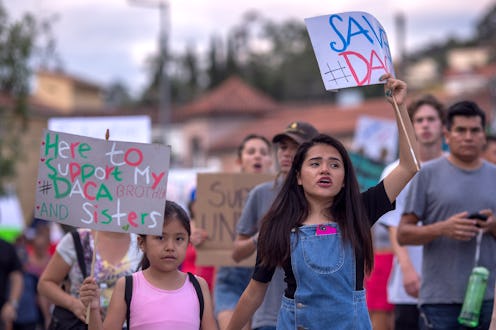
On Tuesday, a federal judge in San Francisco ordered the Trump administration to resume the Deferred Action for Childhood Arrivals program. However, what the new DACA ruling means is not necessarily a victory, even though it provides temporary relief.
Donald Trump announced in September that he was ending DACA, leaving roughly 800,000 undocumented immigrants at risk of deportation. In response, several states and organizations sued the Trump administration, and this week, Judge William Alsup ruled that the administration must “maintain the DACA program on a nationwide basis."
In his ruling, Alsup wrote that DACA recipients must be allowed to renew their status, but here's the thing: The federal government will not be obligated to accept new DACA applications from undocumented immigrants who had not previously applied to the program.
That the administration has been ordered to let DACA start up again is a step in the right direction, California Attorney General Xavier Beccera told the Times. However, according to immigration advocate Camille Mackler, the fact that Alsup's ruling applies only to renewals — and not to new applications — indicates that DACA recipients will only really be protected when they are given legal status.
"This is not a win for us," Mackler told the Times. "We’re obviously glad that this is going to provide some relief, but what we really need is a clean Dream Act." A "clean" Dream Act means legislation that purely protects DACA recipients instead of including immigration policy changes proposed by Republicans in return.
Alsup is allowing the Trump administration to maintain its policy of banning DACA recipients from re-entering the U.S. once they leave the country. Moreover, Trump's White House could rapidly appeal Alsup's ruling, The New York Times reported. Despite the fact that Alsup's ruling is ultimately limited in its scope, the White House described the judge's decision as "outrageous, especially in light of the president's successful bipartisan meeting with House and Senate members at the White House on the same day."
Trump did indeed hold a bipartisan public meeting on immigration on Tuesday, but the meeting merely illustrated the drawn-out, complicated nature of the immigration debate. According to The Atlantic, Trump took many different positions at the meeting. He also advocated for a "clean" Dream Act — but seemed to misunderstand what that meant, because he wanted to include an increase in border security in the same bill. He then suggested a more comprehensive immigration overhaul that he previously opposed, but subsequently changed tactics and demanded that Congress include funding for a southern border wall in the original DACA bill.
Attempts to insert border security into legislation concerning DACA recipients have been frustrating for Republicans and Democrats alike — Republicans can't avoid the wall issue because their president campaigned on it, while Democrats refuse to pass any legislation that provides for the wall.
“Hardliners in the administration and on Capitol Hill are now demanding 90 percent of their immigration agenda in exchange for 10 percent of the Democrats’ immigration agenda,” immigration advocate Frank Sherry — executive director of America’s Voice — told The Atlantic.
But Trump himself does not appear to have a clear vision for immigration policy. During his meeting with Congressional officials, he waffled between agreeing to support a clean DACA bill and inserting border security measures into such a bill.
Trump's back-and-forth on the issue seemed, in part, to enable Alsup to make his ruling; in fact, Alsup even cited Trump's previous tweets on the matter, in which the president appeared to defend DACA. Nonetheless, the rather confusing nature of Trump's meeting with Congressional officials, coupled with Alsup's somewhat limited ruling, makes it clear that the fight to protect DACA recipients is far from over.